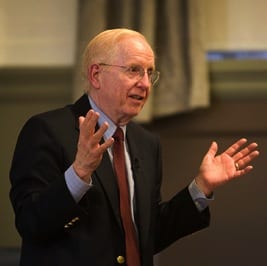Visie van professor Ed Lawler: ‘New world needs new management model’
Door Alexander Crépin Ed Lawler is een interessante wetenschapper. Jaren geleden wist hij mijn aandacht al te trekken met de uitspraak dat binnen 10 jaar HR onder de verantwoordelijkheid van IT managers zou kunnen komen te vallen als HR de aandacht niet zou verleggen van beheersmatige activiteiten naar actieve ondersteuning van managers bij het realiseren van doelstellingen.
Via Twitter werd ik geattendeerd op een interview met hem over de noodzaak van een management model, management 3.0. Een aantal citaten uit het interview die mij aanspreken:
 Leadership, for example
Leadership, for example
With the movement away from command and control management to high involvement management, we became fascinated with leaders and ascribed a lot of the effectiveness of organizations to the behaviour of leaders and so forth, and I think that has gone way too far.
We have lost a lot of the managerial blocking and tackling that people in supervisory positions have to do in order to make organizations effective. It seems to me that, if you are going to have a valid, viable 3.0, it has to include the right blend of leadership behaviours. Yes, where you inspire people by a sense of mission, sustainability, accountability – but also have a valid management approach which deals with fundamentals like goal setting and work specifications and product evaluation produced by employees. So we do not want to lose some of the key managerial skills as we have, I think, in searching for these magical leaders who are going to inspire and direct people.
It is kind of a balance between leadership and management in these people: You have to be a leader but also, if you are not a manager at the same time, I think it’s Henry Mintzberg who talks about it, it’s dispiriting.
Yes, I think that is exactly right, it is the balance. We have spent a lot of time training people on leadership, which some people learn and some people don’t, to be frank, and we have lost a lot of the fundamental manager skills or [they] were never developed. We still see managers doing terrible basic management – like performance reviews are done just awfully and the answer seems to be, “Well, let’s just eliminate them.” Well, to me, that is just insane. How are you going to direct and control behaviour if you do not have some kind of accountability and some sort of reviews that look at people and give them feedback and give them a sense of direction?
Just knowing that we are going to [have] sustainability as a major thrust of the company does not translate into day-to-day behaviour very easily. You need to be able to make that translation from the sense of vision and mission and so forth, to actual behaviours, and that is the managerial part of being an effective manager and leader.
How about how we design organizations? How would that be different under 3.0?
I think it depends substantially on what business you are in, how sophisticated the business is, and how complex it is, but I see much more self organizing, much more use of information technology, social networks, and perhaps even internal markets to create the forum and allocate financial resources within organizations, and that’s an area where there would be enormous differences.
In a book that Chris Worley and I did called Built to Change , we emphasized very strongly structures that would give people external interface with the market so that nobody is more than 2 or 3 degrees separate from the external market. I think that’s the right emphasis and we need to build on that kind of thinking because touching the market, being interfaced with the market, helps direct peoples’ behaviour internally and gives them a sense of how the business is doing and certainly motivates them to perform well.
So, I think that piece of the design is critical. What I don’t think we did enough with, in the Build to Change book, is to emphasize how organizations can be built out [using] social networks and how money can be allocated to innovations and start-up operations and how they can be converted from ideas to actual operating businesses.
Interessant leesvoer naar mijn idee. De vraag is en blijft op welke termijn de ontwikkelingen ook zichtbaar gaan worden? Naar mijn idee zal dit samenhangen met de opkomst van generatie Y medewerkers in ‘management’ rollen. Ik verwacht dat zij meer open staan voor de hier beschreven ontwikkelingen dan de Babyboomer generatie en de generatie X, die moeten veel van wat zij geleerd hebben als de ‘juiste’ wijze los gaan laten. Dat is ongeveer het meest lastige wat er is.
Meer op www.inhr.nl



Plaats een Reactie
Meepraten?Draag gerust bij!